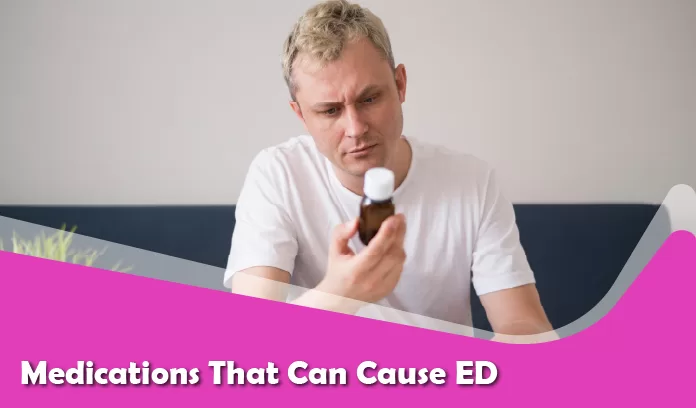Erectile dysfunction (ED) can have many causes, including medical conditions, stress, and lifestyle factors. However, one often overlooked cause is medication. Some prescription drugs can interfere with blood flow, nerve function, or hormone levels, leading to temporary or ongoing ED symptoms. Understanding which medications might contribute can help you have informed conversations with your healthcare provider.
Antidepressants and Serotonin Levels
Certain antidepressants, particularly selective serotonin reuptake inhibitors, can interfere with sexual function by affecting brain chemicals linked to arousal and desire. They may reduce libido or delay ejaculation. Consulting a doctor about dosage or alternative medications helps manage mental health effectively while minimising side effects that impact sexual performance.
Blood Pressure Medications
Drugs that lower blood pressure, such as beta-blockers and diuretics, can reduce blood flow to the penis, making it harder to achieve or maintain an erection. Adjusting medication type or dosage under medical supervision can often restore balance, allowing effective blood pressure management without compromising sexual health or satisfaction.
Antipsychotic Drugs
Medications used to treat psychiatric conditions can alter hormone levels, especially dopamine, which influences desire and arousal. These drugs may also cause fatigue or sedation, reducing sexual interest. Discussing symptoms with a healthcare professional allows for adjustments that maintain emotional stability while protecting healthy sexual response and overall well-being.
Hormonal Treatments
Therapies that affect hormone production, such as anti-androgens or drugs for prostate conditions, can lower testosterone and decrease libido. Reduced hormone levels impact mood, energy, and sexual performance. Monitoring hormonal balance through regular medical checkups helps manage treatment outcomes while maintaining both physical and sexual vitality effectively over time.
Chemotherapy and Cancer Medications
Cancer treatments often affect nerve function, hormone levels, and blood circulation. Chemotherapy can temporarily or permanently impact erectile ability. Maintaining open communication with healthcare providers helps address side effects early. Supportive therapies, counselling, or medical solutions can help restore confidence and improve quality of life during and after treatment.
Anti-Seizure Medications
Drugs used for epilepsy and seizure control can disrupt nerve communication and hormone balance, influencing arousal and erectile function. These medications may also cause fatigue or drowsiness. Adjusting treatment plans or adding supportive therapies under medical guidance can improve symptoms and maintain both neurological stability and healthy sexual activity.
Opioid Painkillers
Long-term use of opioid medications can suppress testosterone and alter the body’s natural hormonal balance. This reduction leads to decreased libido and difficulty achieving erections. Consulting a doctor about alternative pain management methods or supervised dosage reduction can help regain normal function and restore overall hormonal equilibrium.
Antihistamines and Decongestants
Common allergy and cold medications may temporarily affect blood flow by constricting blood vessels, making erections more difficult. Although these effects are usually short-term, frequent use can increase the risk. Choosing non-drowsy or alternative remedies with medical advice helps relieve symptoms without negatively affecting sexual performance or function.
Muscle Relaxants and Sedatives
Medications prescribed for muscle pain or anxiety can slow down the nervous system, decreasing arousal and sensitivity. They may also cause fatigue or reduced alertness, affecting sexual performance. Reviewing these medications with a healthcare provider ensures proper dosage and helps balance relaxation benefits with maintained sexual health.
Antifungal and Ulcer Medications
Some drugs used for fungal infections or stomach ulcers interfere with hormone metabolism, leading to reduced testosterone or altered circulation. Over time, these effects may contribute to erectile difficulties. Regular monitoring and communication with medical professionals allow adjustments to treatment that preserve both health and sexual wellbeing.
Conclusion
While certain medications can cause erectile dysfunction, these side effects are often manageable with the right guidance. Being open with your healthcare provider ensures you get the best possible treatment without compromising your well-being. For personalised recommendations or medication adjustments, consult a medical professional before following any health advice or starting a new health plan.


